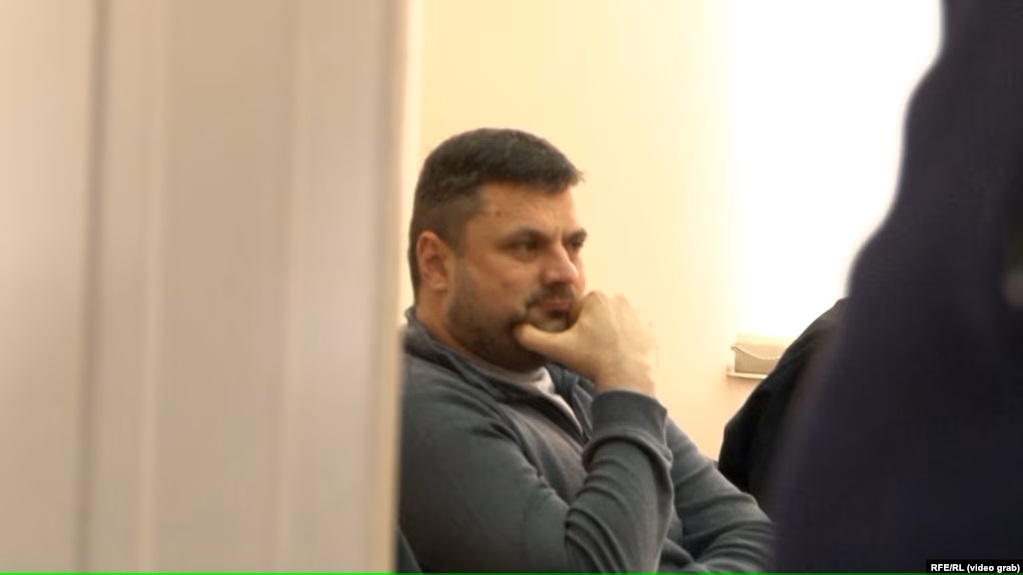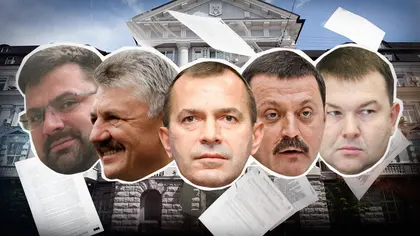The State Bureau of Investigations (SBI) has completed a criminal investigation of the treasonous actions of Oleg Kulinich, former Head of the Main Department of the State Security Service of Ukraine (SBU) in Crimea, the State Bureau reported on April 5. He was arrested in Ukraine in July 2022. The findings raise both concern and questions.
The SBI revealed the following about Kulinich’ subversive activity:
JOIN US ON TELEGRAM
Follow our coverage of the war on the @Kyivpost_official.
In May 2019, Kulinich was introduced to the group closest to the leadership of the SBU. In October 2020, he was appointed as the Head of the Crimean Main Department of the SBU and after that had access to most of the secret information held by the SBU and controlled parts of the work of the Counter-Intelligence Department of SBU.
Kulinich apparently had knowledge of Russia’s plans for the invasion of Ukraine from the territory of Crimea, but he held back this information from the SBU central office. After the Russian offensive, he blocked attempts to update the SBU leadership on the situation in the region, ordered his subordinates to leave it and distributed arms to people who were not SBU personnel.
Moscow “political office” for Ukraine
Kulinich was part of a larger Russian spy network embracing senior officers in the SBU and other governmental agencies, according to the Bureau’s press release and it disclosed wiretapping recordings of his talks with his Moscow supervisors.

Latest on Russia’s Intransigence to End War Against Ukraine
His activity was coordinated by a so-called “political office” in Moscow, set up before the war by ex-Deputy Head of the National Defense and Security Council of Ukraine (NSDC), Volodymyr Sivkovych and Andrii Kluev, ex-head of the President Yanukovych’s Administration, upon the order of the Russian Federal Security Service (FSB).
This “political office” was directly controlled by two FSB officers, called Chumakov and Chulindin, and coordinated by their colleague Maryna Terentyeva, the SBI reports.
Sivkovych, believed to have been behind the brutal suppression of the demonstrators on Kyiv’s Maidan during the mass protests in 2013-14, and Kluev, escaped to Russia after the Revolution of Dignity in Ukraine in early 2014.
They were identified by the then UK Foreign Secretary, Liz Truss, in January 2022 as being included in Russian plans to install them as part of a pro-Russian leadership in Ukraine after President Volodymyr Zelensky’s government was overthrown.
Acting on Sivkovych’s orders, Kulinich attempted to appoint “his people” to SBU offices in Ukrainian border regions (Chernihiv, Sumy, Kharkiv, Lviv, Odesa etc.) as well as the NSDC and other central governmental bodies.
In 2021, he lobbied for Andrii Naumov, another FSB agent, to be appointed to the position of the First Deputy Head of the SBU. It seems the FSB network succeeded in dismissing Major General Ruslan Baranetsky from this position in July 2021 but failed to secure Naumov’s appointment.
Kulinich transferred information to Sivkovych through the “Threema” messaging app, as revealed by the SBI who published some of their wiretapped conversations.
“Hunter” – another high-level FSB agent
Naumov, 40 years old, who was nicknamed “Hunter,” had worked in the General Prosecutor’s Office of Ukraine and in the state agency managing the Chornobyl zone.
In 2019, Naumov was appointed Head of the Main Department of Internal Security in the SBU, and in October 2020, Zelensky promoted him to “brigade general.” He left the SBU in July 2021.
Naumov was known among leading Ukrainian investigative journalists as “the wallet of Ivan Bakanov,” Head of the SBU in 2019-2022 and Zelensky’s close friend, and “controller of Ukrainian smugglers”
Naumov left Ukraine the day before the Russian massive attack and was later detained in Serbia under suspicion of money laundering (he was traveling together with an alleged Ukrainian smuggler and 600,000 euros were found in his car).
 Andriy Naumov attends a hearing before the High Court in Nis, Serbia, on April 6, 2023. RFE/RL
Andriy Naumov attends a hearing before the High Court in Nis, Serbia, on April 6, 2023. RFE/RL
The SBI accused him of fraud and submitted an extradition request to Serbia. A decision is still awaited.
Who is to blame or implicated?
Some commentators, most notably Yuri Butusov, a military observer, chief editor of the Ukrainian media platform Censor.net, and an outspoken critic of the Ukrainian president, believe Zelensky and Bakanov should bear political and, perhaps, criminal responsibility for promoting FSB agents Kulinich and Naumov. Butusov voiced this view on his YouTube channel on April 9.
According to Butusov, in the case of Kulinich there might have been a violation of the 2014 “lustration” law which prohibits appointment of the former FSB personnel to Ukrainian public offices. Kulinich graduated from the FSB Academy in 1994 and served in the Russian Federal Counter-Intelligence Service, as reported by the SBI.
In July 2022 Zelensky removed Bakanov from his post along with the General Prosecutor, Iryna Venediktova. He announced that 651 criminal proceedings against officials across several high-level offices had been registered for allegedly collaborating with Russians or working against the nation’s goals.
“Such an array of crimes against the foundations of the national security of the state and the connections detected between the employees of the security forces of Ukraine and the special services of Russia pose very serious questions to the relevant leadership,” Zelensky said.
Links to another Russian agent Derkach?
Butusov suggests that Kulinich probably had connections to Andrii Derkach, former General Director of the Ukrainian National Nuclear Company “Energoatom” during the period 2006-2007. Kulinich was the Vice-President of “Energoatom” during the same period.
In 2021, the US Government accused Derkach of being a “Russian agent” and sanctioned him for interference in the 2020 US elections.
In June 2022, the SBU reported that Derkach had been working for the Intelligence Directorate of the General Staff of the Russian Armed Forces since 2016. In January 2023, he was stripped of Ukrainian citizenship and his status as a parliamentary deputy.
Other Ukrainian appointees of the Moscow “political office”?
The investigation of the SBI and SBU raises questions about other “appointees” of the Sivkovych-Kluev “political office,” who are still active in Ukrainian politics and not mentioned in the Bureau’s press release, Butusov emphasized.
The current Head of the parliamentary Committee on Finance, Tax and Customs Policy, Danylo Hetmantsev, was an assistant of Sivkovych when he was a member of the Ukrainian parliament. Hetmantsev was elected to the current Verkhovna Rada as a member of Zelensky’s “Servant of People” party.
Another assistant to parliamentarian Sivkovych was Valerii Kolukh, who has also been elected to the Rada from the President’s party.
The president’s Office, Hetmantsev and Kolukh had not commented publicly about Butusov’s accusations at the time of this publication.
To add to the intrigue, Sivkovych is known in the past to have been close professionally and through family ties with journalist and lawmaker Mykola Kniazhytsky, currently a leading member of ex-president Petro Poroshenko European Solidarity faction. Back in 2016, another well-known journalist, Serhiy Leshchenko, publicly accused him of being a close ally of Sivkovich.
It appears that the results of the official investigation concerning Kulinich may have re-opened a can of worms, with embarrassing questions for both President Zelensky’s administration and a broader group of officials and public figures from the previous political eras.
You can also highlight the text and press Ctrl + Enter










